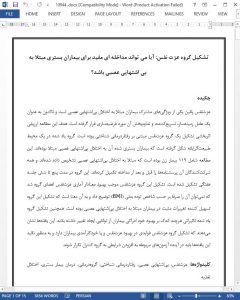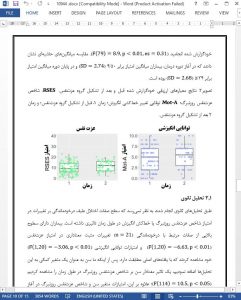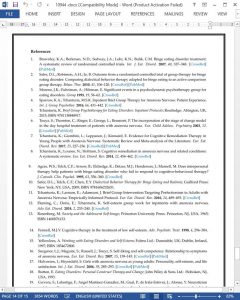Abstract
Low self-esteem is a common feature in Anorexia Nervosa (AN) and has been hypothesised to act as a predisposing, precipitating, and perpetuating factor. The aim of this study was to assess the effectiveness of a Cognitive Behavioural Therapy (CBT)-based self-esteem group in a naturalistic setting of patients with AN in an inpatient treatment programme. Included in this study were 119 female patients diagnosed with AN, with all participants completing self-report questionnaires before and after the intervention. The group consisted of five to six weekly sessions. The self-esteem group led to a statistically significant improvement in self-esteem, which could not be explained by an increase in BMI alone, suggesting that the group is facilitating positive changes within an AN group. The group also had a small effect on improving patients self-perceived ability to change. These findings suggest that the brief self-esteem group has some benefits in improving patients’ self-esteem/self-efficacy and should be replicated in the future with a control condition to confirm findings.
1. Introduction
Attempts have been made to explore various group treatment modalities that are effective in improving the symptoms and maintaining factors for patients with AN [1,2]. Although there is no evidence that the treatments offered in a group setting are superior to individual treatments, there is a growing body of literature that recognises group therapy as an effective, meaningful, and cost effective form of psychological intervention [3,4]. It has been recognised that group interventions provide a safe therapeutic setting to learn from others, practice communication skills, and provide psychoeducational and homework materials [5]. Although previous research suggests that positive outcomes were evidenced in the implementation of Interpersonal Therapy, Dialectical Behaviour Therapy, Cognitive Remediation Therapy, body image, perfectionism, and motivational models [6–11], much uncertainty exists about the most efficacious intervention for AN if offered in a group format [12].
5. Conclusions
In conclusion, self-esteem improved for patients with AN over the duration of a brief CBT-based self-esteem group. With so few studies focused on self-esteem available in the literature, there is a need for further research, especially those that utilize a controlled design. The self-esteem, amongst other group interventions, can be a helpful element to inpatient treatment programmes where the length of stay is short or unknown and when multi-session individual interventions are limited. It can also be useful when patients are severely unwell and therefore may not be able to engage in deep psychological work.










